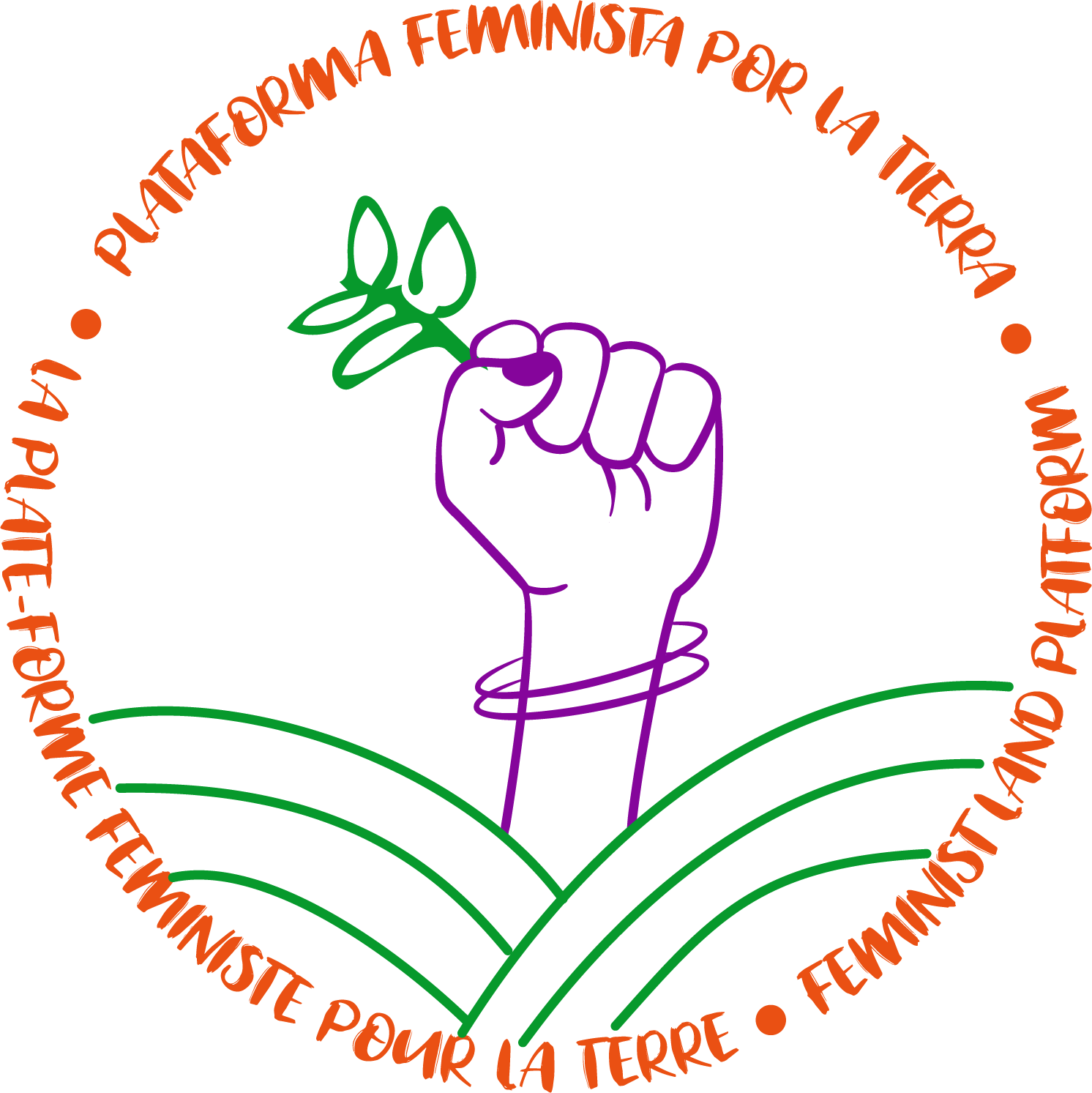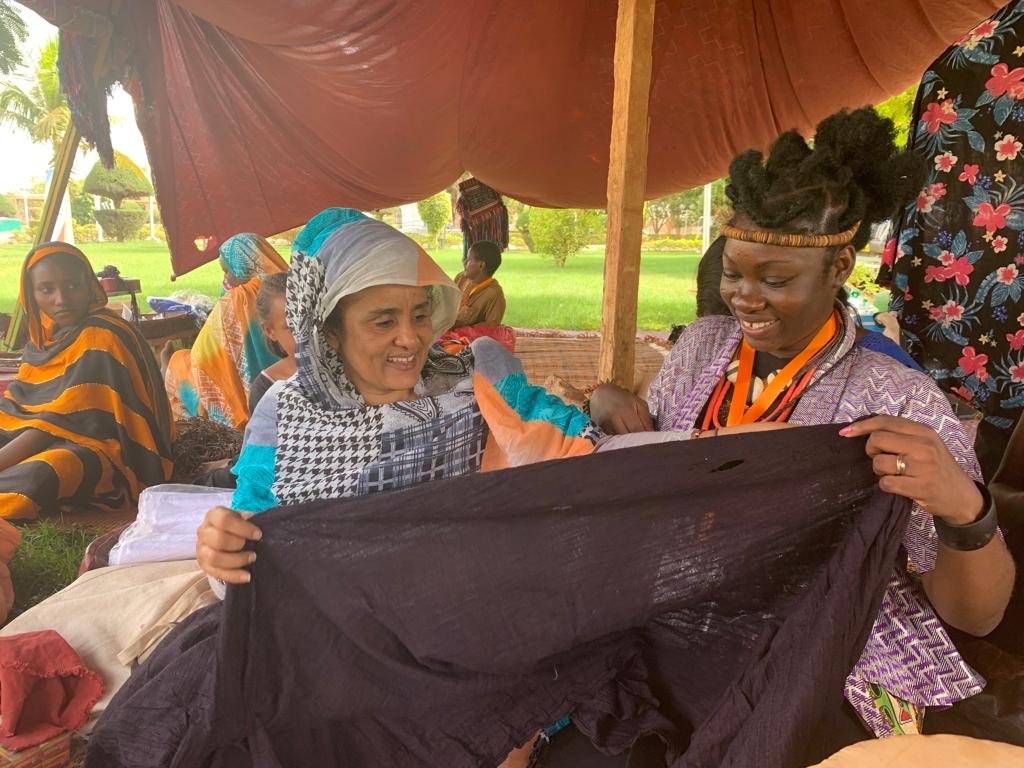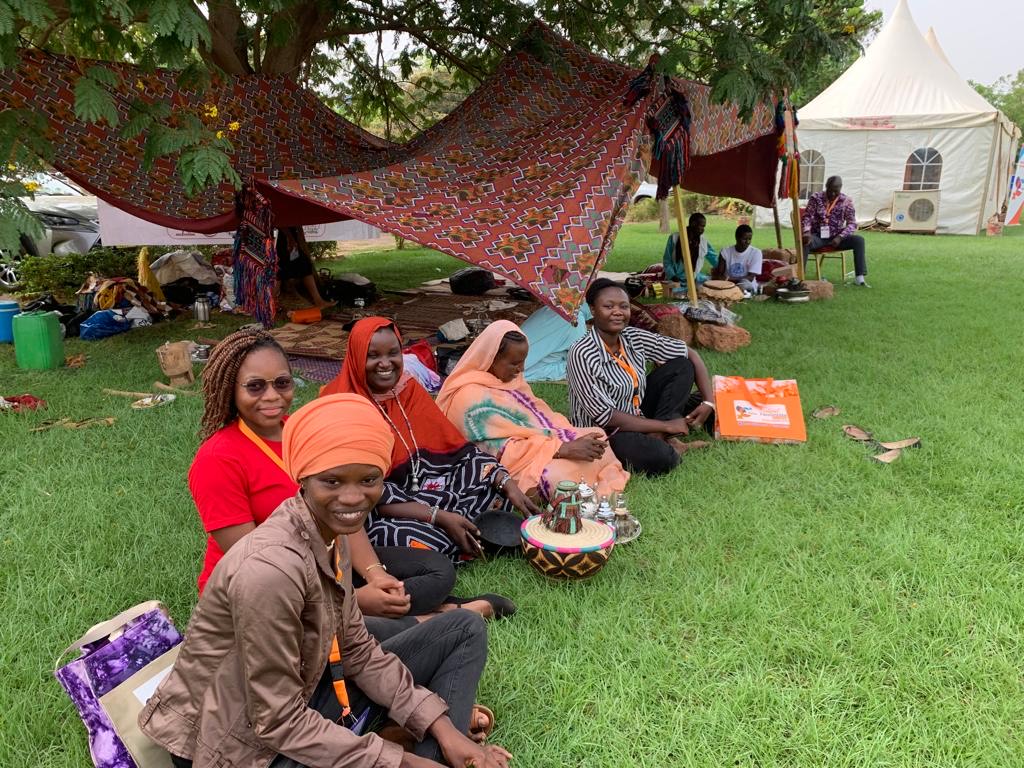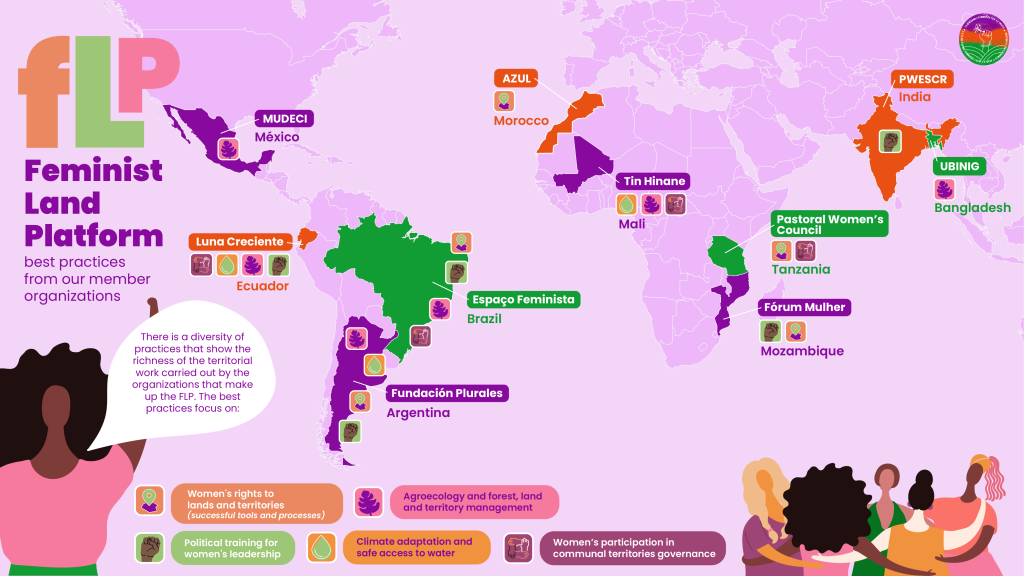The difference in languages and geographic origins is no barrier to creating bonds of affection and activism. Proof of this was the experience shared by the women of the Feminist Land Platform (FLP) during the regional meeting held in Brasília, capital of Brazil, between August 13th and 16th. In three special moments, these diverse women came together to strengthen each other, their organizations, and the Platform.
On the first two days, the regional meeting of FLP organizations from Latin America brought together 15 women from four countries: Espaço Feminista (Brazil), Luna Creciente (Ecuador), Fundación Plurales (Argentina) and Mudeci (Mexico). On the third day, they were joined by 25 women from the state of Pernambuco, in the Northeast of Brazil, who represent the different territories, communities and identities that make up Espaço Feminista.
All these processes culminated on the last day of the event, with the participation in the Marcha das Margaridas (March of the Daisies). One of the largest feminist mobilizations in Latin America, the march takes place every four years and brings together more than 100,000 women in Brasília.

Regional meeting of the Feminist Land Platform
At the regional meeting, promoted by the FLP thanks to the support of the Ford Foundation, the Platform’s member organizations from Latin America were represented not only by their leaders, but also by other women who make up the organizations and are leaders in their territories.
“This meeting was very important for us. We were able to discuss the actions carried out so far and plan what is most relevant for our organizations and the Platform in the coming years. This was done through a process of collective discussion, based on the experiences and needs of each organization”, stated Patrícia Chaves, from Espaço Feminista.
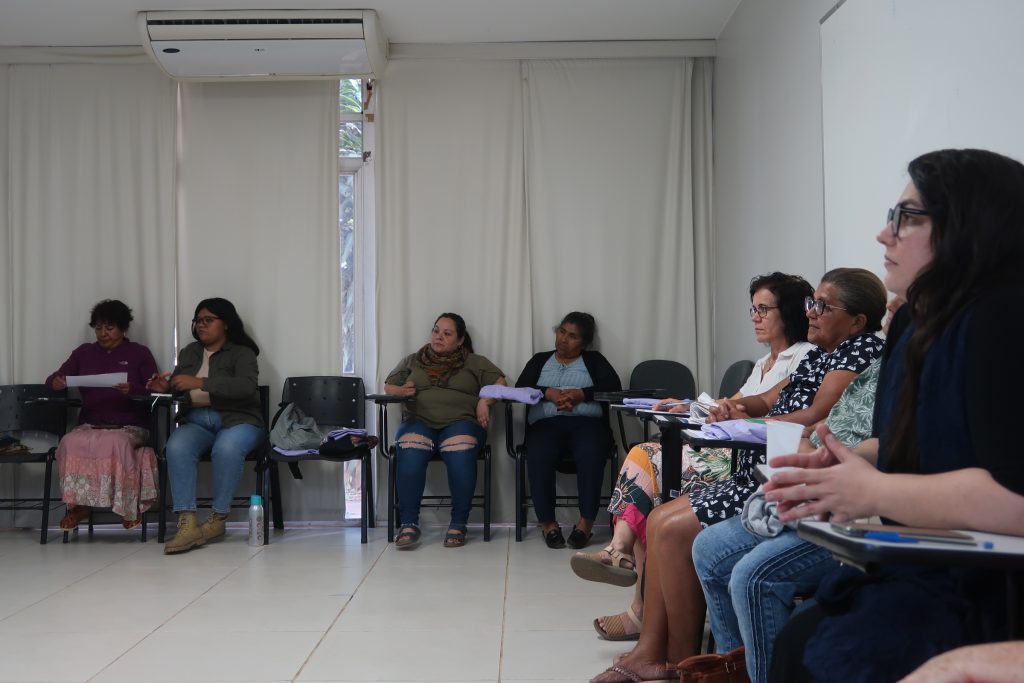
During the two-day meeting, they debated topics such as qualified political advocacy, feminist education, mobilization of resources, democratization of access to information and to knowledge production, communication through counter-hegemonic means and defense of nature, with a clear opposition to extractivisms and appreciation of the wisdom of traditional peoples.
“We reflected on the systematization of the work and experience of women community leaders and on the importance of sharing our practices with other women in our global network”, noted Elsa Maria Arroyo, from MUDECI.
In small groups and then together, they shared the main strategies adopted by their organizations and the gaps they encounter to go further in their missions. Based on this, they defined strategies to increase the Platform’s impact, thus reaching increasingly wider spaces based on their knowledge, voices, and perspectives.
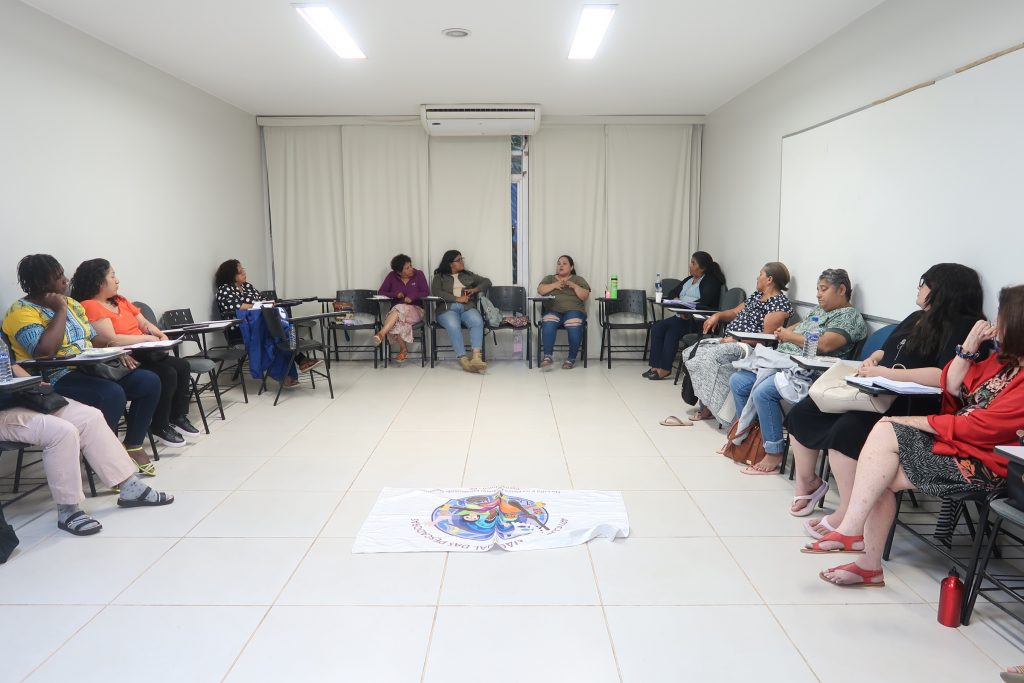
Verónica Luna, from Fundación Plurales, considers that participation in spaces of exchange, learning and collective decision-making like this one has repercussions on the daily actions of organizations: “It helps each person and each organization grow in the exercise of citizenship. It’s also an exercise of democracy, which currently seems so fragile and must be taken care of.”
Meeting with women from Pernambuco
In a second moment, 25 women farmers, fishermen and quilombolas, coming from different parts of the Brazilian state of Pernambuco, joined the women already present in Brasília. They experienced an exciting space of exchanges that helped give a broader dimension to their struggles, reinforcing the perspective that the problems they encounter in their territories are structural, and thus common to all in the Global South.
Patrícia Chaves highlighted that this was a very important moment not only for the Platform, but also for the women of Espaço Feminista, because it created a bond among them all. “A farmer from Pernambuco present at the meeting summarized this experience: she said that she was used to only seeing the reality of the municipality of Bonito, where she lives, and on that trip, she realized that she is not alone and that her struggle is the same of thousands of women, whether in Argentina, in Mexico, in Ecuador…”, said Patrícia.
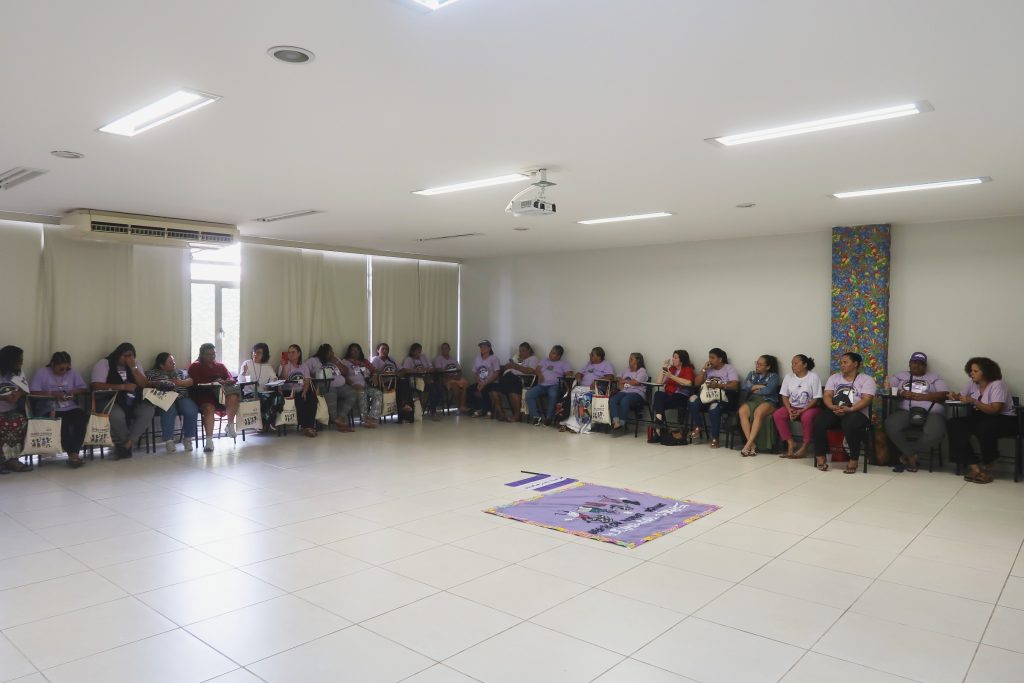
Likewise, the participants from other countries were happy with the opportunity to learn about the work of women from Pernambuco, as reported by Elsa Maria Arroyo: “I was inspired by these women, like the ones who are part of quilombos, fight to obtain property titles and are a historical symbol of heroic resistance against slavery and oppression.”
Walking together in the Marcha das Margaridas
Finally, the two groups joined the more than 100 thousand women from the countryside, forests, waters, and urban areas who took to the streets of Brasília on August 16, demonstrating for the right to land and territories, for the end of violence against women, and for health and education.
One of the largest women’s actions in Latin America, the Marcha das Margaridas (March of the Daisies) pays homage to Margarida Alves, a union leader brutally murdered 40 years ago for defending the rights of rural workers. In its 7th edition, the demonstration had the motto “For the Reconstruction of Brazil and for Good Living”.

FLP women from other Latin countries marched alongside those from Pernambuco, making their bonds of solidarity even stronger. “Marching together with comrades from different spaces, organizations, and countries, but with the same ideal, was an honor and a privilege. Taking public space and making our voices heard is a practice that should be valued”, added Verónica Luna. “This experience brought a perspective of collective resistance and belonging. At that moment, we were all sisters”, defined Patrícia Chaves.
“Having participated in this mobilization as part of the international delegation, invited by the Feminist Land Platform, was a wonderful experience that shows that Margarita Alves did not die, she lives in the memory of the Brazilian people”, added Elsa Maria Arroyo.

Yenny Nazareno, from Luna Creciente, noted that women from five continents were present, “and we all shouted with one voice, regardless of language or race. We marched and said that we are not alone and that together we can transform the world.”
Zita Suárez, from the same organization, was grateful for the opportunity to participate in the event: “I was able to share positive energies with thousands of empowered and strengthened women, that nurtured us to continue our struggles”.
After these enriching days, the women of the Feminist Land Platform continue resisting, now even more strengthened, fighting for Good Living and experiencing day by day what they sang together in the streets of Brasília: “We will keep marching, alert and strong, we will go on, together”.


